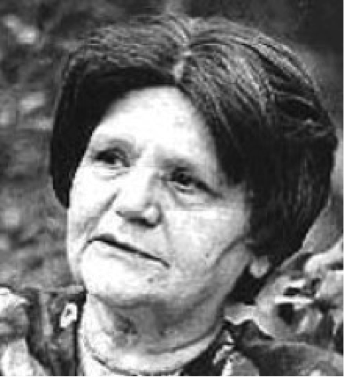
June 20, 1914
Zelda Schneurson Mishkovsky, known simply as “Zelda,” was one of the most widely acclaimed and personally beloved of Israeli poets. The daughter and granddaughter of Chasidic rabbis, Zelda was born in Russia on June 20, 1914. Her first cousin was Rabbi Menahem Mendel Schneerson, the famous Lubavitcher Rebbe who was regarded by his followers as the Messiah. In 1928, Zelda’s family made aliyah to the land of Israel. The family settled in Jerusalem, and both Zelda’s father and grandfather died shortly afterwards. She became a teacher and spent most of her adult life living with and caring for her mother, in both Haifa and Jerusalem. In 1950, at the age of 36, Zelda married Chayim Aryeh Mishovsky, and he moved into the home that Zelda shared with her mother. Zelda’s small family was an anomaly in the Orthodox Jewish world. She was an only child and had no children of her own. Her mother passed away and her husband fell ill soon after they married. When he died, Zelda was devastated. She and her cousin, the Rebbe, maintained a prolific correspondence about grief and loss, spirituality, and the need to engage with life. Alone, Zelda moved to a less religious neighborhood in Jerusalem and opened her home to young female boarders, becoming a close, maternal figure for many of these young women. Zelda began writing poetry while she was attending a religious teacher’s college in 1950. Her poetry was and is enormously popular with readers of all backgrounds, in Israel and abroad, and has garnered many prizes. Her language is distinctive, filled with allusions to Chasidic folklore and Jewish theological terms, and “rich with imagery that is at once sensual and spiritual.”[1] Amos Oz, the internationally acclaimed novelist, was her student. In his memoir, he wrote of her
strange, anarchic Hebrew, a Hebrew belonging to …Chasidic tales and folk tales, a Hebrew overflowing with Yiddish, violating every rule, mixing feminine with masculine, present with past, noun with adjective—a sloppy, even muddled Hebrew. But what vitality there was…And what strange, hypnotic sweetness there was in her tales about all kinds of miracles! As though the writer dipped the letters in wine: the words went spinning in the mouth.[2]
Zelda’s poem “For Every Person There is a Name” is recited each year on Holocaust Remembrance Day in Israel. The text of the poem can be read here. Zelda died on April 30, 1984, which was Holocaust Remembrance Day. [1] Falk, Marcia. “Strange Plant: Nature and Spirituality in the Poetry of Zelda: A Translator’s Reading.” Religion & Literature 23.3 (Autumn, 1991): 97-108. [2] Oz, Amos. A Tale of Love and Darkness. London: Chatto & Windus, 2004.
